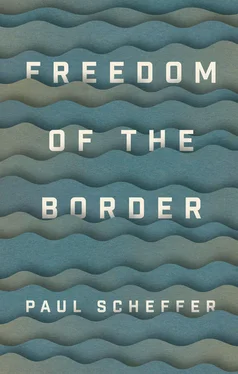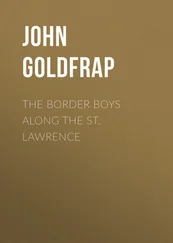However understandable our embrace of national borders, an observation by Italian writer Paolo Giordano invites us to reach beyond them. ‘The epidemic pushes us to behave in a way that is unthinkable under normal circumstances, to recognise that we are inextricably connected to other people, to consider their existence and wellbeing in our individual choices. ... In the contagion we become, again, a community.’ 15
We have many years behind us in which our main concern was to extend the reach of freedom, a reaction to the society of the 1950s, which was increasingly experienced as restrictive and subservient. Crossing boundaries was an imperative for many of my generation: life had an ever-expanding horizon and a world without borders was the highest ideal. But how habitable is that ideal now? I have become convinced that an open society can exist only within borders. This book is not about the borders of freedom, therefore, but about the freedom of borders.
To what extent does a civilization need boundaries if it is to promote human rights? Our first task is to measure our civilization against norms that we value ourselves. The history of European civilization is also a history of barbarism, including slavery in the colonies and genocide at home, but even a community filled with a sense of historical responsibility cannot simply open itself up to all the needs of the world.
Experience teaches us how difficult it is to overcome our own constraints. The history of the old continent shows that traditions, identities and traumas permeate the past of all nations. Before we can cross borders we must learn to understand their significance. Humility lies at the very root of cosmopolitanism.
Dealing with borders is perhaps the greatest challenge of our time. Now that borders seem to be falling away, it has become a matter of urgency to determine the form that freedom needs to take. My search has not led me to a nostalgic conclusion. On the contrary, I am looking for a contemporary ideal of progress. Starting from the idea that borders make freedom possible, can we expand in a lasting way the circle of people with whom we identify? Is it possible to give shape to a transnational community?
The future of the European project lies at the centre of all this. It ought to be a source of hope but is more often than not a source of despair. Europeans are becoming aware of how vulnerable the Union now is. They realize that the fate of Greek or Romanian or French citizens directly affects them all, yet the psychological distances between North and South, East and West, have only grown, as a result of crises around the common currency and the shared external border.
Europe has dismantled its internal borders without giving sufficient thought to its external border. Think of the wars in neighbouring regions and the movement of refugees that results. How can a European community take shape without turning its back on the world? The needs of the countries bordering the Union are pressing, but can we really contribute to peace and prosperity in countries like Ukraine, Turkey, Syria and Egypt?
Sustainable involvement in the wider world depends on a notion of progress. Despite the widely held view that Western societies are gripped by a fear of the future, there are plenty of signs that majorities are open to change if offered a direction. Conversely, if given nothing to hold onto, people retreat into their shells. Populism is first of all a form of protectionism.
We saw this with Brexit. The powerful resonance of ‘take back control’ says a great deal. The slogan touches upon a sense of powerlessness and insecurity in a time in which borders seem to be losing their significance. The election of Trump – who made the building of a wall along the Southern border the central image of his campaign – illustrates this change in the collective mood. For many it came as a shock.
It was in the English-speaking world that the breakthrough of populism took place, in countries that see themselves as in the vanguard of globalization. This should give us pause. Perhaps it is precisely in those societies that inequality and alienation have increased as a result of a failure to keep a proper watch on the balance between openness and protection. Their relatively large-scale immigration was a symbol of their open attitude, in which economic and humanitarian motives overlap.
It is striking that in our time employers and human rights activists tend to use the same language. This combination of market and morality soon leads people to underestimate the value of the social contract within a society. Human rights and citizens’ rights are not one and the same. Whereas human rights have no limits, citizens’ rights are given shape only within borders. It’s no accident that social security is under strain in a time of globalization. Economic and humanitarian disavowal of borders can easily reinforce each other.
A future-oriented outlook therefore starts with an understanding of the rational elements within criticism of globalization, rather than a dismissal of all unease as irrational. Talk of an angry multitude is incompatible with this approach. 16Such psychologizing is objectionable on many grounds. It suggests emotional closeness – ‘we feel your pain’ – but creates distance, since it’s always a matter of other people’s unease, other people who are in the grip of delusions. The clash of interests and ideas in a time of globalization is not taken seriously, so the conversation ends before it can begin.
In any case, a bit of self-examination would not go amiss. It soon becomes clear that visions of decline exist all along the political spectrum. Supporters of the European Union who say war will break out again if the euro collapses are just as guilty of summoning visions of catastrophe as opponents of the euro. The millions of people who demonstrated in the 1980s against the forward deployment of American nuclear weapons in Europe were motivated by fear of a nuclear war.
In this book I discuss the consequences for an open society of the erosion of borders. Polish-British sociologist Zygmunt Bauman has placed the issue in a broader context: ‘There is good reason to conceive of the course of history as pendulum-like, even if in other respects it may be portrayed as linear: freedom and security, both equally pressing and indispensable, happen to be hard to reconcile without friction – and considerable friction most of the time.’ 17In other words, a borderless world can end up depriving us of our freedoms.
This investigation begins with a philosophical contemplation of the meaning of cosmopolitanism, followed by a more empirical consideration of globalization ( Part I). I then look at the causes and consequences of migration and the refugee crisis ( Part II). Finally I examine the present state of Europe, chart the new world disorder and discuss various ideas about the future of the European Union ( Part III).
It is a triptych concerned first with the significance of attachment to place in a time of globalization, then with the crossing of borders, which creates new fault lines in society, and lastly with possible ways of reconciling freedom and security in Europe. It explores the questions lurking behind the reality of the euro crisis, the refugee crisis and populism. Can the gap be closed between citizens who are looking for protection and citizens who embrace openness?
1 1 Paul Scheffer, ‘De doos van Pandora’, De Haagse Post, 31 March 1990, pp. 34–9.
2 2 Paul Scheffer, Alles doet mee aan de werkelijkheid: Herman Wolf 1893–1942, Amsterdam, De Bezige Bij, 2013.
3 3 Martin Walser, Deutsche Sorgen, Frankfurt am Main, Suhrkamp, 1997.
4 4 Günter Grass, Deutscher Lastenausgleich, Munich, dtv, 1993.
Читать дальше












